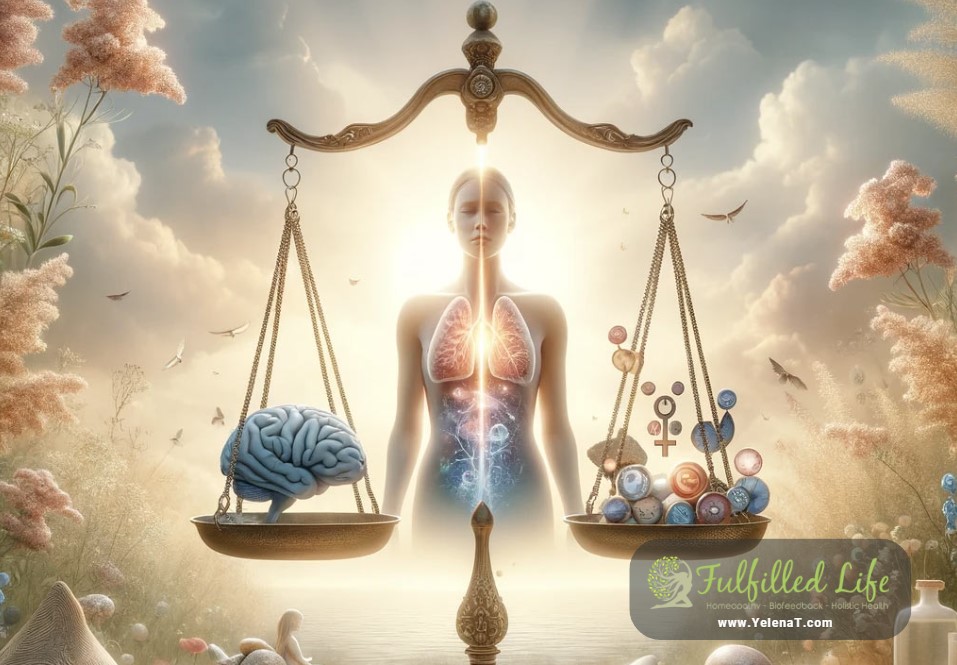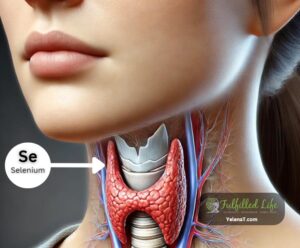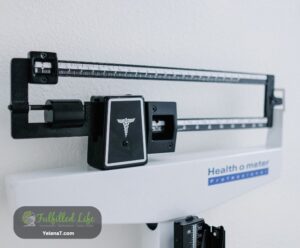Do you ever find yourself riding an emotional rollercoaster, wondering why your moods seem to have a mind of their own? You’re not alone.
Emotions can be like a turbulent sea, influenced by various factors, including hormonal imbalances. As a Doctor of Holistic Health, I’ve seen how understanding the connection between hormones and emotions can empower individuals to take charge of their emotional well-being.
In this article, we’ll explore how hormonal imbalances can impact your mood and emotions, and I’ll share holistic practices and techniques to help you foster emotional resilience and well-being.
Hormones and Emotional Wellness: Understanding the Connection
Hormones play a significant role in regulating our emotions. For many women, hormonal fluctuations can lead to mood swings, irritability, and emotional turbulence. Hormonal imbalances can result from various factors, not limited to natural life stages such as menstruation, pregnancy, perimenopause, and menopause. It’s essential to recognize that our environment and lifestyle choices can also contribute to hormonal disruptions. Here are some additional reasons why hormonal imbalances may occur:
- Toxins and Environmental Factors: Exposure to environmental toxins, such as endocrine-disrupting chemicals found in certain plastics and pollutants, can interfere with hormone production and regulation.
- Stress: Chronic stress can elevate cortisol levels, affecting the balance of other hormones like estrogen and progesterone. This can lead to mood swings and emotional disturbances.
- Dietary Choices: A diet high in processed foods, sugar, and unhealthy fats can disrupt insulin levels and contribute to hormonal imbalances. On the other hand, a balanced diet rich in nutrients can support hormonal health.
- Medications: Some medications, including birth control pills and certain psychiatric drugs, can impact hormone levels and lead to mood swings and emotional changes.
- Medical Conditions: Conditions like polycystic ovary syndrome (PCOS), thyroid disorders, and adrenal gland issues can disrupt hormone production and regulation, resulting in emotional and mood-related symptoms.
Recognizing these additional factors is crucial in addressing hormonal imbalances comprehensively.
Common Symptoms of Hormonal Imbalance
- Irritability: Do you find yourself easily annoyed or agitated, even over minor issues?
- Sadness or Anxiety: Frequent bouts of sadness, anxiety, or a feeling of being overwhelmed.
- Mood Swings: Experiencing abrupt shifts in mood, from happiness to sadness or anger without apparent cause.
- Fatigue: Feeling unusually tired, even with adequate rest and sleep.
- Sleep Disturbances: Trouble falling asleep or staying asleep throughout the night.
- Weight Fluctuations: Sudden weight gain or loss, especially around the abdomen.
- Changes in Libido: A decreased interest in sex or changes in sexual desire.
- Digestive Problems: Bloating, constipation, or diarrhea that seems unrelated to your diet.
- Skin Issues: Acne, dry skin, or excessive oiliness that persists despite skincare efforts.
- Hair Changes: Hair loss or unwanted hair growth in unexpected areas.
- Migraines: Frequent headaches or migraines that coincide with hormonal shifts.
- Cognitive Symptoms: Memory problems, difficulty concentrating, or brain fog.
Understanding the root cause of these symptoms can be the first step in regaining control over your emotions and achieving emotional wellness.
Understanding the Importance of Hormonal Testing
To truly transform hormonal imbalances into emotional wellness, it’s crucial to comprehend your unique hormonal profile. Hormonal testing provides vital insights into specific hormonal levels and patterns causing mood swings and emotional fluctuations. Identifying these imbalances allows for a tailored approach to rebalance both the hormonal and emotional aspects of your well-being.
Modern healthcare empowers you to take charge of your well-being conveniently from home. I can assist you in accessing comprehensive hormone testing kits designed to assess hormones like estrogen, progesterone, cortisol, thyroid and other hormones. With this information, we can develop a personalized holistic plan, including dietary recommendations, lifestyle adjustments, and holistic modalities like biofeedback, herbs and homeopathy.
Incorporating hormonal testing into your journey towards emotional wellness empowers you with knowledge and confidence to achieve hormonal balance, translating to emotional harmony.
Emotional Well-Being Strategies
Given the diverse causes of hormonal imbalances, adopting holistic practices becomes even more critical. Here are some practices that can help you regulate your emotions naturally:
- Balanced Nutrition: Eating a balanced diet rich in whole foods, especially those containing essential nutrients like Omega-3 fatty acids and B vitamins, can help stabilize mood swings. Eating a whole foods diet and eliminating processed foods can help your body detoxify and maintain hormonal equilibrium.
- Detoxification: Consider periodic detoxification programs under the guidance of a healthcare professional to rid your body of accumulated toxins.
- Regular Exercise: Physical activity releases endorphins, which can boost your mood and reduce stress.
- Natural Skincare: Opt for skincare products free of harmful chemicals and toxins to support healthy skin and reduce hormonal disruptions.
- Herbal Remedies: Herbal supplements like chasteberry and St. John’s Wort have been shown to help alleviate hormonal mood swings.
- Aromatherapy: Explore the soothing effects of aromatherapy by using essential oils like lavender, chamomile, or bergamot. These oils can be diffused, applied topically, or added to a warm bath to promote relaxation and emotional well-being.
- Homeopathic Treatments: Discover the benefits of personalized homeopathic remedies designed to address your unique emotional needs. A certified homeopath, like myself, can guide you on this holistic journey.
- Stress Management: Incorporating stress-reduction techniques such as meditation, yoga, and deep breathing exercises can be incredibly effective in managing emotional turmoil.
- Breathwork: Explore different breathwork techniques such as box breathing, alternate nostril breathing, or the 4-7-8 technique. These practices can help you manage stress and regulate your emotions by harnessing the power of your breath.
- Expressive Arts: Engaging in creative activities such as painting, drawing, journaling, or playing a musical instrument can be therapeutic for emotional regulation. These forms of self-expression allow you to release emotions and gain insight into your feelings.
- Sleep Hygiene: Prioritize good sleep habits by maintaining a consistent sleep schedule and creating a calming bedtime routine. Quality sleep is crucial for emotional stability and hormonal balance.
- Nature Connection: Spending time in nature, whether it’s a leisurely walk in the park or a weekend hiking trip, can have a profound impact on emotional well-being. Nature has a calming and rejuvenating effect on the mind and body.
- Mindfulness: Practice being present in the moment to help you manage emotional reactions.
- Journaling: Keeping a journal can help you identify patterns in your emotions and track your progress.
- Seek Support: Talk to friends, family, or a health professional about your emotional challenges. You don’t have to go through this journey alone.
- Holistic Therapies: Explore holistic therapies like acupuncture, massage, biofeedback or energy healing, which can complement traditional treatments for hormonal imbalances.
- Self-Compassion: Be kind to yourself and remember that it’s okay to have emotions. Don’t judge yourself for feeling a certain way.
- Consultation with a Specialist: If you suspect that environmental toxins or underlying medical conditions are contributing to your hormonal imbalances, seeking guidance from a qualified healthcare professional can provide valuable insights and solutions.
Understanding the connection between hormonal imbalances and emotions is the first step toward achieving emotional wellness. By adopting holistic practices, fostering emotional resilience, and seeking personalized support, you can regain control over your emotional journey. Remember, you don’t have to navigate this path alone. Reach out, seek help, and take charge of your emotional well-being today.
Take the Next Step: Schedule Your Complimentary Consultation
If you’ve found this information resonates with your experiences or concerns, I invite you to schedule a complimentary consultation with me, a Doctor of Holistic Health, Board Certified Naturopath and Homeopath. Together, we can explore the various factors contributing to your hormonal imbalances, develop a personalized holistic plan for emotional well-being, and address any questions or uncertainties you may have.








